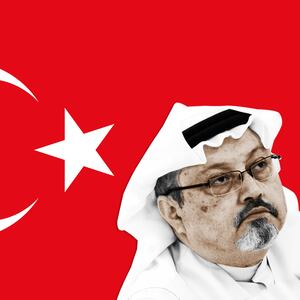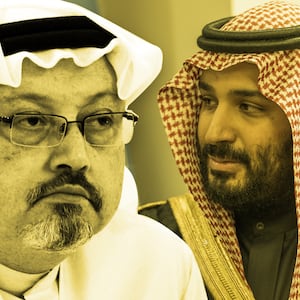In an apartment on New York City’s Upper East Side, one of Saudi Arabia’s most well-known diplomats stood in front of a crowd of 50 or so invite-only guests at a hush-hush, boozy soiree and tried to assuage worries about his country’s rulers.
It was Nov. 9—more than a month after the disappearance of journalist Jamal Khashoggi—and Turki al-Faisal, the kingdom’s former intelligence chief, faced a slew of questions about his country’s role in the operation in Istanbul. He’d spoken publicly since the news broke, but this time, his audience was much more intimate. It included colleagues and writers, journalists, politicos, and think-tankers, many of whom attended political parties with him in the past.
“I’d been to this apartment before and had even been to an event where Faisal was the featured speaker, but I had no idea what to expect from this meet and greet,” one of the attendees told The Daily Beast. “It was very clear that we were all there for a reason. And it wasn’t just to have a glass of wine and a chit-chat.”
While it is normal for Saudi Arabian diplomats to hold meetings with influential individuals in media and politics under ordinary circumstances, the intimate cocktail party seems to have been Faisal’s latest attempt to boost Saudi’s image in the wake of Khashoggi’s disappearance on Oct. 2. Over the past month, Riyadh has attempted to manage the fallout of the Khashoggi murder and the subsequent international condemnation behind the scenes, enlisting well-known and respected dignitaries like Faisal to make amends.
“There is a remarkable effort to change people’s minds,” said Hussein Ibish, senior resident scholar at the Arab Gulf States Institute in Washington. “The problem is the Saudi government isn’t particularly skilled in that. It’s going to take time and people are going to want deeds not words.”
For now, though, it looks like that’s all the Saudis have to offer: words. And Faisal appears to be one of the chosen messengers.
For the past several weeks, the diplomat, who lives in Virginia and teaches at Georgetown, has embarked on a campaign to reach out to politicians, businessmen, and think-tank leaders to restore relationships the Kingdom relies on to keep its voice alive in Washington. He’s spoken publicly to news outlets and on panels. The party Nov. 9 marked the second time in the last month that the diplomat spoke to a small, exclusive group.
Since then, recordings from Khashoggi’s killing have been released to foreign governments and the CIA has determined that Mohammed Bin Salman, the de facto ruler of Saudi Arabia also known as “MBS,” ordered Khashoggi’s killing.
The party took place in a classic—and classically posh—uptown, East Side apartment. Plated finger foods, assorted cheeses, and charcuterie were picked at by guests. Attendees got wine and cocktails from the open bar and gathered to listen to Faisal. He spoke for 15 minutes before taking questions, attendees told The Daily Beast.
He told those in the crowd that despite the brutal killing of Khashoggi by Saudi operatives, there was nothing to worry about. After all, he said, Riyadh was working tirelessly to conduct a thorough investigation of the operation in Istanbul and would punish those responsible accordingly, according to three people who attended the event.
Later, Faisal said the Saudi government would refuse an outside investigation into Khashoggi’s death. He likened the hypothetical investigation to one that the U.S. refused to have for its actions in Abu Ghraib. In that case, the U.S. investigated itself, Faisal said. It was a point he had made earlier on a panel at the International Peace Institute.
“The kingdom is not going to accept an international tribunal to look into something that is Saudi,” he said during his remarks on the panel. “And the Saudi judicial system is sound, it is up, it is running, and it will take its course.” Saudi Arabia, he said, will “never accept foreign interference in that system.”
Faisal’s did not attempt to change people’s minds on what had happened to Khashoggi, attendees of the party said. Instead, he tried to convince them that despite all that had happened, the U.S. could still continue business as usual with Saudi Arabia.
The sentiment—that nothing would change with U.S.-Saudi relations—bothered many in the crowd, sources at the party told The Daily Beast.
“There was a lot of chatter after about Faisal. People were really skeptical about what he had said and whether any of it was legit,” one attendee said. “Nothing he was saying really made me believe that things were going to be different moving forward.”
Last week, the Trump administration announced its plan to sanction the 17 individuals allegedly involved in the killing of Khashoggi, including Saud al-Qahtani, a former top aide to MBS, and Mohammed al-Otaibi, the Saudi consul general in Istanbul. Hours earlier, the Saudi government announced it had indicted 11 individuals for the killing and issued death sentences for five of them.
Democrats in Congress have for weeks now pushed for harsher punishment for Saudi Arabia, vowing to draft legislation in the new year that could potentially limit arms sales to the country and draw back U.S. support for the coalition in Yemen.
To do that, though, the U.S. would need to reconsider its entire foreign policy strategy, and that’s a risk Saudi is not willing to take.
Enter Faisal.
The former intelligence chief told people in the crowd that the U.S. and Saudi Arabia couldn’t possibly move away from their strategic partnership. Too much was at stake, he said, including thwarting Iran’s aggression in the Middle East. For that, the country would lean on Israel, too, he said.
Only one person from the audience in New York seemed particularly eager to press Faisal—about the Khashoggi case, and about the kingdom’s war in Yemen. This individual asked whether Saudi Arabia would continue its mission there or whether it had received pressure from the U.S. to change course.
No planned changes, Faisal replied, though Saudi Arabia was, of course, open to communicating with the Trump administration. The White House shows no signs of backing down from its close relationship with the kingdom and MBS. In a Fox News interview over the weekend, President Trump said he didn’t know if he trusted the CIA’s findings that Mohammed bin Salman had ordered the killing of Khashoggi.
“I don’t know, you know, who can really know?” Trump said. “But I can say this—he’s [MBS] got many people now that say he had no knowledge.”
It’s unclear where Faisal will speak next or how long he will continue to hold round tables about the Khashoggi murder. In at least one instance, the diplomat has been disinvited from speaking. Harvard Belfer Center’s Kennedy School asked Faisal last month not to attend a long-planned week in residence.
But, observers said, there’s no doubt that Saudi Arabia will continue on with its massive public relations effort. The question is whether Riyadh will be able to make up for lost time.
“How do you wash this blood off? This isn’t a stain you can easily get rid of,” Ibish said. “It is going to take another narrative to overcome this narrative. And it’s going to take talking to more people than those on the invite-only list.”







